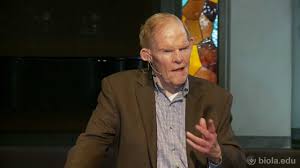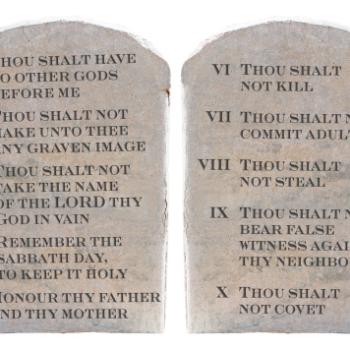 Dr. Haddon W. Robinson died eleven days ago, on July 22, at 86 years of age. He was known as an accomplished preacher. But throughout his career, he mostly taught the craft of preaching to young men in seminary who aspired to be preachers as well. There are many preachers today, worldwide, whom Dr. Robinson taught how to preach.
Dr. Haddon W. Robinson died eleven days ago, on July 22, at 86 years of age. He was known as an accomplished preacher. But throughout his career, he mostly taught the craft of preaching to young men in seminary who aspired to be preachers as well. There are many preachers today, worldwide, whom Dr. Robinson taught how to preach.
I knew Dr. Robinson, though not well, many years ago. It was during the early part of his career when he was a professor at Dallas Theological Seminary. He was a warm and friendly person. At DTS, he became an extension of Professor Howard Hendricks, who was so beloved by students as a Bible teacher and preacher there.
In the following years, Haddon Robinson moved on to become president of Denver Seminary and then interim president at Gordon-Conwell Seminary. Yet, all this time amidst his administrative duties, he always remained a professor of preaching as well. That was the nucleus of his ministry. In 2006, he was recognized by Christianity Today in the top 10 of its “25 Most Influential Preachers of the Past 50 Years.” He wrote over a dozen books. His best one is Biblical Preaching, which is still used as a textbook in seminaries and Bible colleges worldwide.
Haddon Robinson was known for crafting sermons based on a single theme in the Bible or a single biblical text. So, he taught making the Bible the main basis of preaching. That is what I have always liked as a Christian going back to my late teen years. Since then, I have always attended churches in the Bible church movement that specialize in what Dr. Robinson did, either in preaching or teaching, especially from the pulpit.
I would prefer only to honor and pay tribute to a godly man like Haddon Robinson. Instead, I will only raise a point of critique about one of his beliefs which almost all Christians hold in common, which puts me in the distinct minority. Yet I believed that same way for over thirty years until I became challenged on it from people who showed me several Bible texts. One was John 14.1-4 which involves death and resurrection.
Dr. Haddon Robinson, like many other theologians of his stature, also wrote articles for theological journals and Christian magazines. One of them was an article on Psalm 49 that was published by Christianity Today in 2000. In this article Dr. Robinson says, “For the believer in Jesus Christ, for the righteous person, we do not go out into death and into darkness. Instead, we go home to God.”
By saying this, Dr. Robinson indicated that he believed in the belief held by most Christians that when a believer dies, that person’s immortal soul immediately goes to heaven to enjoy conscious bliss in the presence of God and Jesus. But I don’t think the Bible teaches this. Instead, the Old Testament teaches a lot about what happens to all people when they die, that their souls go to the same place–Sheol.
This word Sheol occurs 67 times in the Hebrew Old Testament. Some English version transliterate it Sheol, as I think it should be done. But other versions render it by various other words, such as “grave,” “pit,” etc. On the contrary, the OT is pretty clear about this, that “the place of the dead,” meaning the souls of humans who died on earth, is Sheol, which ancients called “the underworld” and Greeks named “Hades,” which is comparable to “Sheol,” which is the Hebrews’ name for that place. Yes, it is a place, and I this the OT locates it deep within the earth. For more on this, see my post on 3/6/2014: “Anthropology, the Intermediate State, and Sheol/Hades.”
So, there are many dozens of texts in the OT that I think make clear that human souls are not immortal and at physical death they go down to Sheol to await the resurrection. The foremost book on this subject is by Dr. Alan Segal entitled Life After Death: A History of the Afterlife in Western Religion (Doubleday, 2004, 866 pp.). He shows that the early Christians did not believe in the immortality of the soul, that this belief had originated earlier with Greek philosophers, and that Greeks ridiculed Jews for their then opposing belief in the resurrection of the body (cf. Acts 17.30-32). Centuries later, most Christians believed both as Christians have ever since to this day.
As for the New Testament, Christians who believe it teaches that at human death their immortal souls immediately go to heaven can cite only a bare few texts to support their position. It is mostly Philippians 1.21-23 and 2 Corinthians 5.1-8. But see above post.
On the contrary, there are several NT texts that support what I am saying. One is Jesus’ saying in John 14.1-4. The occasion was the end of the Last Supper, thus only hours before Jesus was to be crucified. Here is how it reads in the NRSV as he speaks to those eleven apostles: “Do not let your hearts be troubled. Believe in God, believe also in me. In my Father’s house there are many dwelling places. If it were not so, would I have told you that I go to prepare a place for you? And if I go and prepare a place for, I will come again and will take you to myself, so that where I am, there you may be also.”
Here in John 14.1-4, Jesus speaks about his heavenly ascension, depicted in Acts 1.9, that will follow his death and resurrection. He means that he literally will ascend to heaven to be with God, who is the Father, “in the Father’s house.” This refers to the city of God in heaven which is described in Revelation 21-22.
When Jesus says, “I will come again and will take you to myself,” he refers to his yet future, glorious, second coming and the simultaneous resurrection of his people from the dead. They will arise from their graves and go up in the air to meet Jesus in the sky, who has just then come from heaven.
But notice Jesus says to his apostles that at that time he will “take you to myself.” How can that be if those men were with him, as conscious souls, all that time in heaven since they had died? On the contrary, their souls were not with him, but in Sheol awaiting this grand event that was their hope for victory over death. This teaching of Jesus confirms that when believers die, their souls do not then “go home to God” but to Sheol to await their resurrection when they will join Jesus in the sky.
As I like to say to my Christians friends when we depart from having fellowship and go our separate ways, “See you in the sky, and see you forever.”













